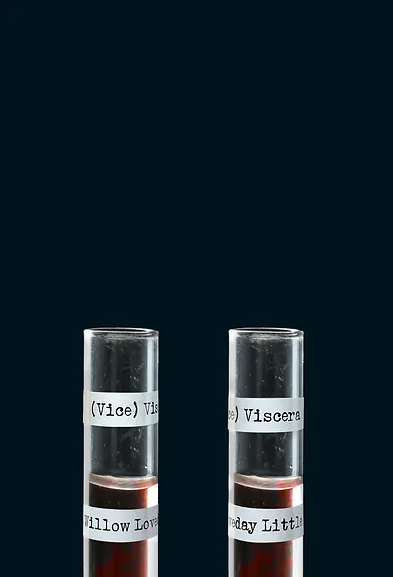When it comes to book reviews, I have always leaned towards measuring artistic merit and ideological cohesion; but here, considering (Vice) Viscera is the first full length collection produced by Cactus Press, I feel it is worth mentioning some aspects of the book as an object and its value as a product.

The reason I find it hard to discuss Loveday Little’s poetry without mentioning the book’s value as a product is the very flow of the book. Considering the phenomenal wealth of ideas and the sheer emotional draw of poem and after poem, my first criticism comes from a purely editorial aspect. The book is rather large for a full-length collection, printed at 144 pages total. While book length has never been an issue to me in itself, I feel cutting the book down by 30-40 pages would have made the collection much more cohesive and the tightening would have counteracted the dilution of some of ideas that at some point begin to repeat themselves. Looking at the book from a bird’s-eye view, I can’t help but think how much better it would have been if only it was a few dozen pages shorter.
Putting the book’s production and editorial decisions aside, Loveday Little is constantly moving in and out of the body. She creates an entire cosmology of the human body when moving inwards. In “(DE)SHELLED” we read “The murk beneath river foam clears. / Your legs, a divinatory pool, are a wishing well of skin / for people to throw copper pennies at, into.” While in “ON EXTISPICY” we read “Normally, I hate being dissected, but with a scalpel of my own, / I’ve been invited to return the favour,” she shortly steps back to envision larger bodies diseased with human interaction; her discourse therefore is both micro- and macro-scopic, spitting in the face of capitalist and patriarchal impositions on the body from close and far.
Loveday Little’s poetics are consistently under the scalpel, ready for surgery, controlled by the grotesque machinery of contemporary medicine. The book’s poetics therefore center around the small, yet seemingly unbreachable gap between disease and the legally controlled linguistics of pain and suffering. Loveday Little makes of this chasm a narrative to wield against medicine in the shape of conversations between the poet and viscera.
Throughout the book, Loveday little keeps using language of mainstream health and wellbeing, each time satirizing and subverting its expectations through offering a chronically sick body against a machinery that willfully ignores and destabilizes its efforts for autonomy.
Loveday Little’s debut is powerful, uncomfortable in the most didactic way, and emotionally engaging. In the span of a single book Loveday Little violently opposes oppressive forces acting on the human body from every side.
Bios

Khashayar “Kess” Mohammadi
Khashayar “Kess” Mohammadi (They/Them) is a queer, Iranian born, Toronto-based Poet, Writer and Translator. They were shortlisted for the 2021 Austin Clarke poetry prize and 2022’s Arc Poem of the year award and they are the winner of the 2021 Vallum Poetry Prize. They are the author of four poetry chapbooks and three translated poetry chapbooks. Their debut poetry collection “Me, You, Then Snow” is out with Gordon Hill Press. Their second book “WJD” is out in a double volume with the translation of Saeed Tavanaee’s “The OceanDweller” from Gordon Hill Press fall 2022. Their collaborative poetry manuscript with poet Klara Du Plessis is forthcoming with Palimpsest Press Fall 2023. [updated spring 2023]

